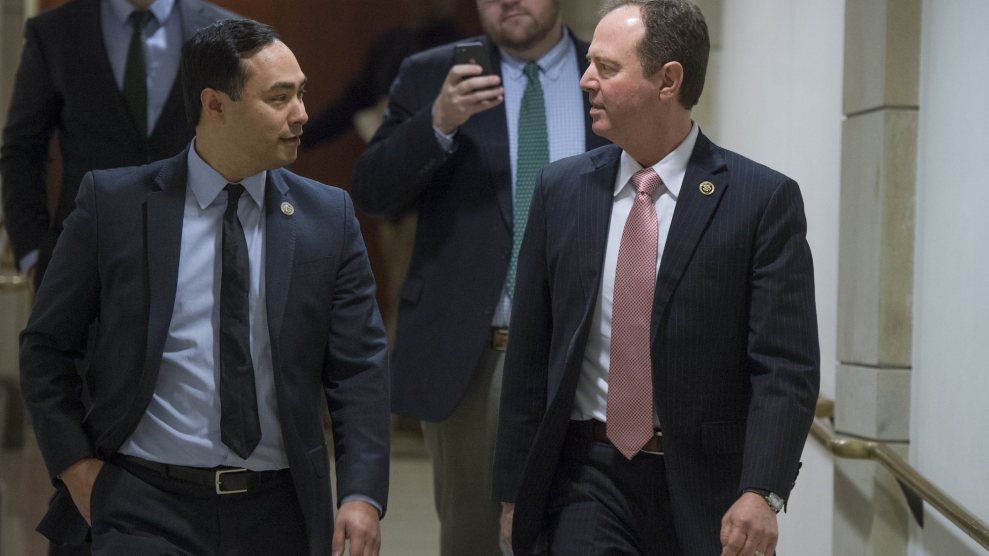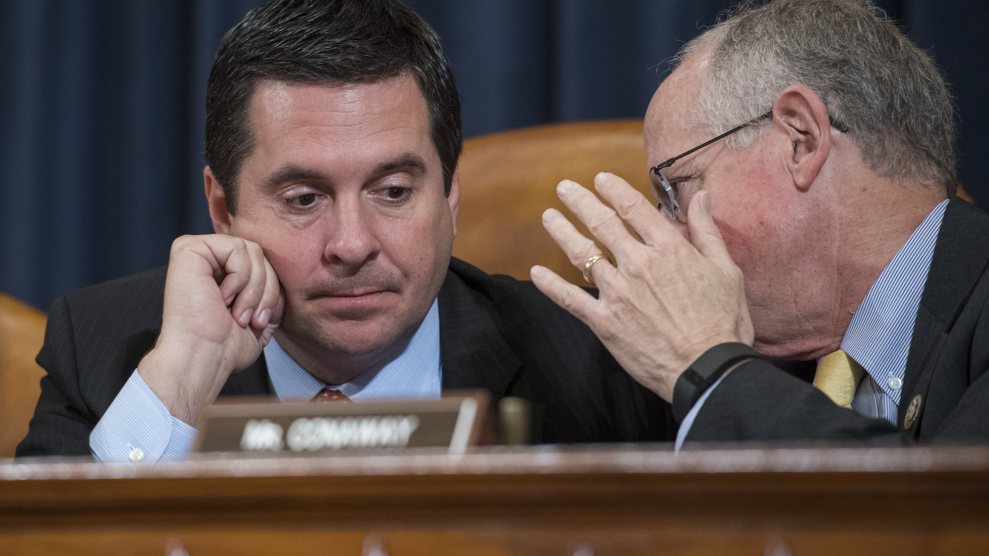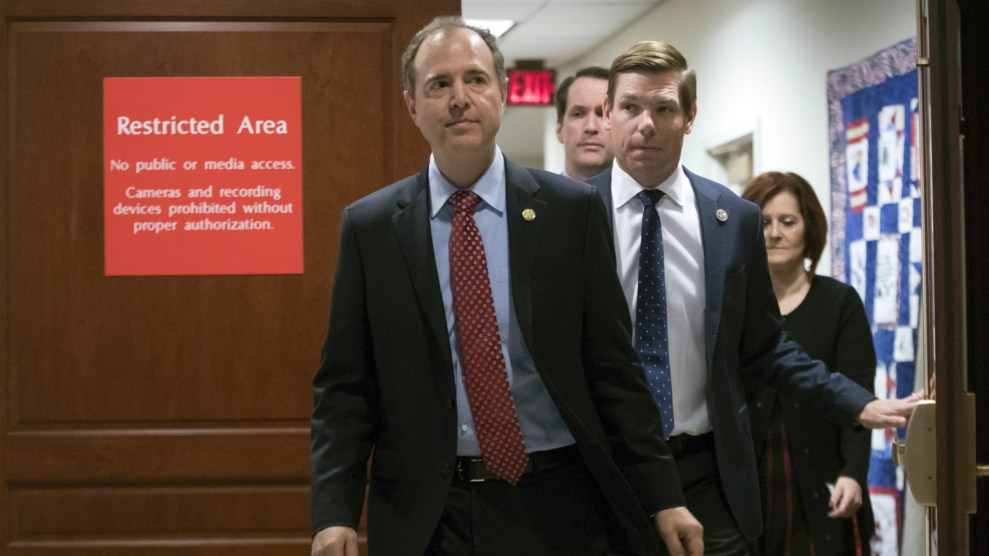
Reps. Adam Schiff right, and Joaquin Castro, Democratic members of the House Permanent Select Committee on Intelligence Committee, on February 15, 2018.Tom Williams/Congressional Quarterly/Newscom via ZUMA Press
Update, November 12, 2021: An earlier version of this article noted that Sergei Millian was reportedly a source for the Steele dossier, as reported by the Washington Post in 2017. In 2021, the Post retracted part of its reporting on Millian and the dossier and said it “could no longer stand by the accuracy of” that report. The article has been appropriately updated.
Republicans on the House Intelligence Committee announced Tuesday that they are ending the committee’s investigation into Russian interference in the 2016 election after finding “no evidence of collusion, coordination, or conspiracy between the Trump campaign and the Russians.”
A Democratic report on the investigation, published Tuesday night, shows why Republicans found nothing: They didn’t try.
The report lays out facts that the GOP does not dispute: Republicans running the committee refused to investigate broad subjects, such as Trump’s financial ties with Russia, or Russian ties to the National Rifle Association. The Republican majority choose to end the probe without interviewing more than 30 witnesses who blew off the committee’s requests, or who Democrats wanted to contact. Nor did the full committee seek information from more than 20 companies and other entities, including a pro-Russia Parisian think tank that paid Donald Trump Jr. at least $50,000 to deliver a speech during the 2016 campaign. Democrats say the result was a circumscribed probe that was designed to avoid finding malfeasance.
The Democrats’ report details the many leads that weren’t pursued, documents that weren’t obtained, and witnesses that weren’t interviewed. Without this information, the report suggests it may be impossible to “determine whether the Russians have leverage over the President of the United States.”
“Conducting a through and impartial investigation of these matters has been a challenging undertaking that has been made much more so by the Majority’s concerted efforts, at the behest of the White House, to undermine our work and that of the FBI and Special Counsel,” the committee’s Democrats write.
In most investigations, investigators follow leads that arise during the inquiry. Intelligence Committee Republicans didn’t do that. For example, last year the committee interviewed Erik Prince, the former CEO of Blackwater, about a United Arab Emirates-brokered meeting he had in the Seychelles with a hedge fund manager close to Russian President Vladimir Putin. Recent press reports suggest Prince misled the committee when he claimed the meeting arose coincidentally, and was not a planned discussion of US-Russia relations. But the committee has not sought clarification from Prince. The New York Times recently reported that George Nader, an adviser to the Emirati crown prince, attended the meeting and is now cooperating with Special Counsel Robert Mueller. But the committee has not tried to interview Nader. Rep. Mike Conaway (R-Texas), who is overseeing the Republican probe, last week told reporters that “I don’t have any clue who George Nader is.”
Committee Republicans have also declined to issue subpoenas following up with organizations and witnesses that refused to turn over information or answer questions, including key witnesses like Donald Trump Jr., Michael Cohen, Jared Kushner, Hope Hicks, and Attorney General Jeff Sessions. Republicans failed to ask witnesses to turn over phone records and other documents, leaving the panel, Democrats say, without vital information to substantiate or disprove their claims.
Guccifer 2.0, which US intelligence agencies believe was a front for Russian intelligence, and WikiLeaks, had Twitter accounts, and used the service and its private messaging function throughout the 2016 campaign. But the committee did not issue a subpoena to Twitter, even though the company told the committee it would not provide messages absent one. The panel also did not subpoena WhatsApp for messages sent by its users under investigation.
Democrats note that the committee failed to follow up after the White House stonewalled a request for records related to President Trump’s May 12, 2017 suggestion that he may have “tapes” of his conversations with former FBI Director James Comey. While the White House responded by referring the panel to a later series of tweets in which Trump walked back the suggestion, the committee had more broadly asked the White House for any records, not just tapes, detailing Trump and Comey’s meetings. Democrats say they have “reason to believe that the White House does in fact possess such documentation;” news reports later revealed White House aide Stephen Miller composed a memo citing Trump’s interactions with Comey. The committee has not sought that memo or any related records.
Some of the most intriguing witnesses who Republicans declined to interview include:
Reince Priebus: Democrats write that the intelligence committee “has reason to believe that Priebus,” who chaired the Republican National Committee in 2016 “met with former Trump campaign chairman Paul Manafort on the same day that Manafort, Kushner and Trump Jr. met with a Russian lawyers and others who claimed to have damaging information on Hillary Clinton.” Did Manafort describe that meeting to Priebus? The House Intelligence Committee has not asked.
Kellyanne Conway: Conway appears to have been in touch during the campaign with a Republican political operative, Peter Smith, who attempted to reach Russian hackers in search of emails that Hillary Clinton deleted from the private server she used while Secretary of State. Smith committed suicide last year before news of his activity broke.
Dimitri Simes: Simes is the CEO of the Center for the National Interest, which hosted an April 27, 2016 foreign policy speech by Trump at Washington’s Mayflower Hotel. The speech was the occasion of a meeting between Sessions and Russian Ambassador Sergey Kislyak in which Kislyak claimed the two-discussed campaign-related matters. (Sessions denies discussing the campaign in that meeting.) Democrats also say that the committee “has reason to believe to that Mr. Simes played a central role in drafting portions of the speech related to Russia.” They urged the committee to seek Simes’ correspondence with Trump campaign officials and people linked to the Russian government.
Sergei Millian: Millan, a naturalized American who leads a group called the Russian-American Chamber of Commerce, and claimed to be close to the Trump family, refused to cooperate with the House committee unless he was granted immunity, Democrats write.
Paul Erickson: Erickson is a pro-gun activist who tried to broker a meeting between Alexander Torshin, a senior Russian official, and Trump or his campaign officials during the 2016 NRA convention. The FBI is reportedly investigating whether Torhsin funneled cash through the NRA to support Trump in 2016. But the House Intelligence Committee is not. The committee has not sought to interview Erickson, or three other people linked to the NRA and its contacts with Russians.
Read the Democrats’ full report below.












